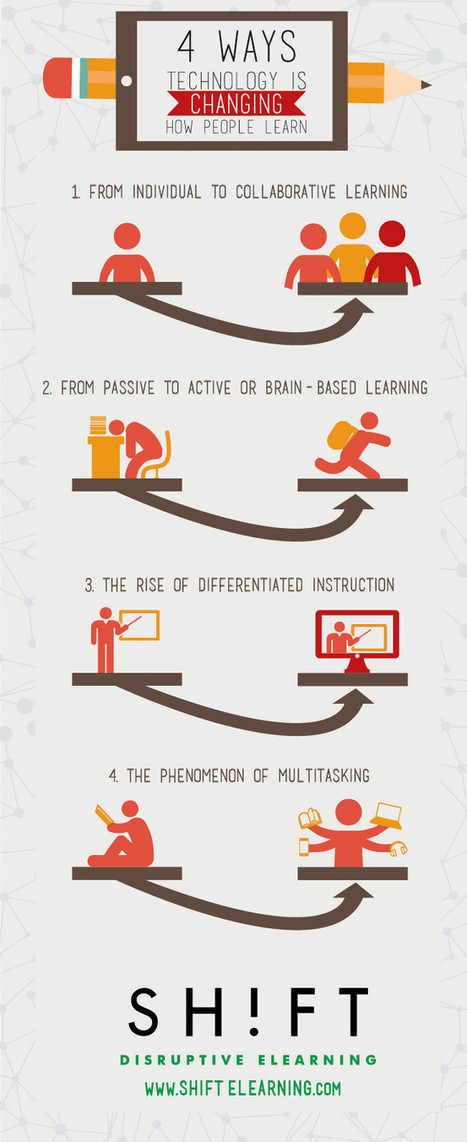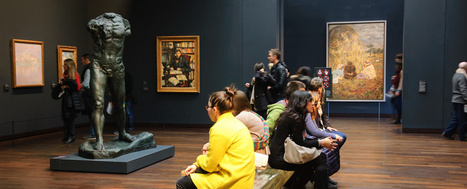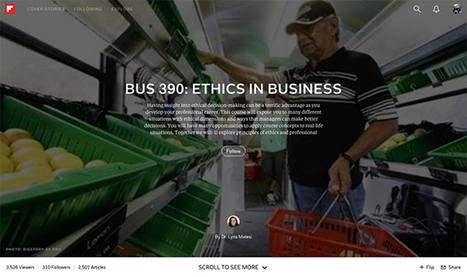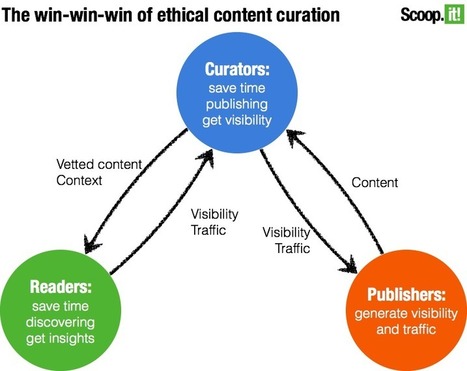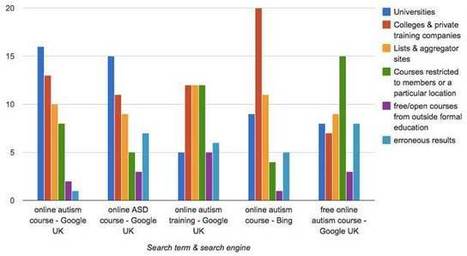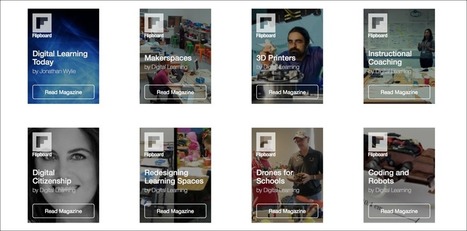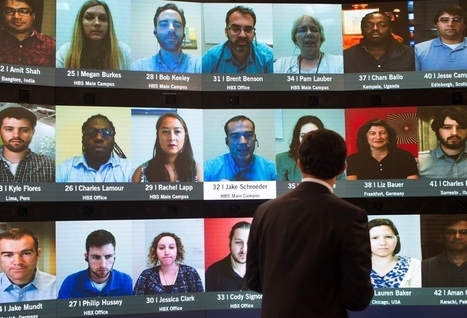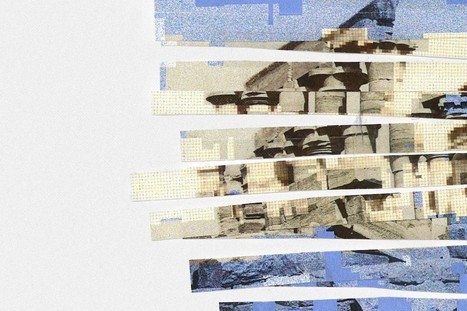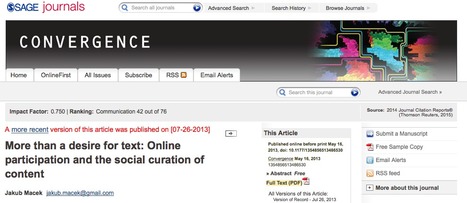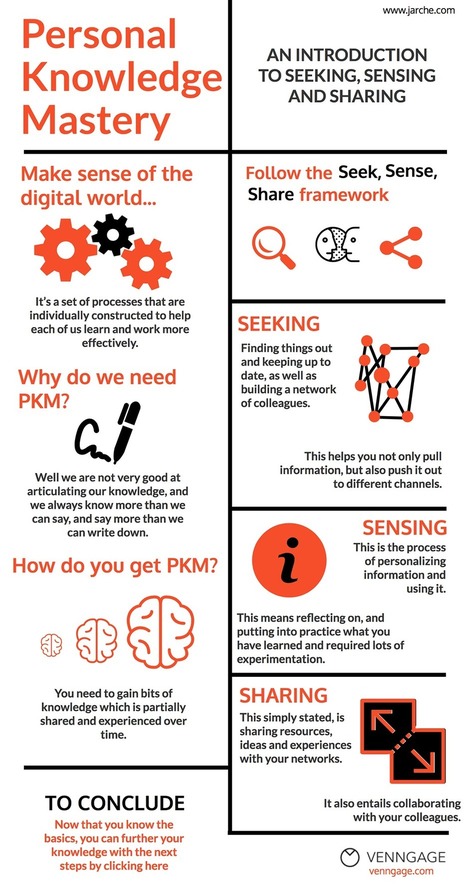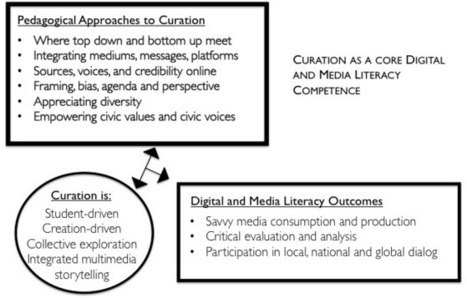 Your new post is loading...
 Your new post is loading...

|
Scooped by
Peter Mellow
April 13, 2016 6:51 PM
|
Curation. Whenever I hear the term I always think of a person working in an art gallery carefully selecting pieces of work for an upcoming exhibition. But I’m also seeing it as a skill needed for m…

|
Rescooped by
Peter Mellow
from Learning and Teaching Online
March 13, 2016 9:52 PM
|
Whether students choose to handwrite, sketch, or type their notes, the challenge lies not in choosing, but in creating a system that allows them to ultimately curate, synthesize, and reflect on what they learn..
Via Nik Peachey, Alexandria Yaxley

|
Scooped by
Peter Mellow
March 12, 2016 6:04 PM
|
Who can now deny that, in the internet, we have the greatest educational tool ever conceived by mankind? Surely no Open Culture reader would deny it, anyway, nor could they fail to take an interest in a new startup aiming to increase the internet's educational power further still:

|
Scooped by
Peter Mellow
January 5, 2016 4:47 PM
|
In recent months, we have witnessed the success of books and articles predicting massive shifts in the way students will experience and complete post-secondary education. Costs will be reduced and outcomes improved, writers argue, when higher ed is unbundled, meaning students pick and choose from a

|
Scooped by
Peter Mellow
December 9, 2015 7:23 PM
|
Instructors are experimenting with the Flipboard news reader to present up-to-date course materials in a magazine-format mobile app.

|
Scooped by
Kim Flintoff
November 4, 2015 7:02 PM
|
Participate Learning, formerly called appoLearning, has launched Collections, a new curation and collaboration tool for educators. Participate Learning's Collections feature lets teachers create a digital folder of online educational resources, such as Web sites, apps and videos, and organize them according to subject, unit, lesson, topic or other organizational criteria. They can even add their own files from Dropbox, Google Drive or other cloud storage services. Any resource with a Web address can be added to a collection. Teachers can then share their collections with colleagues and invite them to discuss items in real time. They also have the option of building collaborative collections on topics of shared interest.

|
Scooped by
Peter Mellow
October 8, 2015 12:33 AM
|
We’ve been asked "how ethical is content curation?" so many times we decided to dig deep to give you a data answer: ethical content curation exists.

|
Scooped by
Kim Flintoff
September 1, 2015 4:12 AM
|
Content Curators as Cultural Intermediaries: “My reputation as a curator is based on what I curate, right?” In 2011 The Economist alerted us to the claim that “digital data will flood the planet.” The exponential increase in data such as e-mails, Tweets and Instagram pictures underpins claims that we are living in an age of ‘infoglut’ (Andrejevic) and information superabundance (Internet Live Stats). Several years earlier, Shirky posed this as an issue not of “information overload” but of “filter failure” (Asay). Shirky’s claim suggests that we should not despair in the face of unmanageable volumes of content, but develop ways to make sense of this information – to curate. Reflecting on his experiences of curating the Meltdown Festival, David Byrne addressed the emergence of everyday curating practices: “Nowadays, everything and everyone can be curated. There are curators of socks, menus and dirt bike trails […] Anyone who has come up with a top-ten list is, in effect, a curator. And anyone who clicks ‘Like’ is a curator.”

|
Scooped by
Peter Mellow
August 20, 2015 8:42 PM
|

|
Scooped by
Kim Flintoff
August 13, 2015 8:49 PM
|
Abstract
A canyonesque gulf has long existed between open academia and many external subject communities. Since 2011, we have been developing and piloting the public open scholar role (Coughlan and Perryman 2012) - involving open academics discovering, sharing and discussing open educational resources (OER) with online communities outside formal education in order to help bridge this gulf. In 2013 we took the public open scholar into Facebook (Perryman and Coughlan, 2013) to reach an international audience of autism-focussed Facebook groups in India, Africa and Malaysia, with a combined membership of over 5000 people.
Performing the public open scholar role within Facebook led to our learning from group members about new resources produced by subject communities outside formal education, for example by voluntary sector organisations, government and professional bodies. These resources are surprisingly numerous and compare favourably with those from universities. Seeking to source more such resources we conducted a systematic large-scale search of free online courses, recording not only the number of learning materials available, but also how easy it was to find them.
We found that provision from formal education, especially universities, dominates the returned results when searching for free online courses. Consequently, resources from beyond formal education, while they exist, are difficult to find. Indeed, most aggregators and repositories proudly state that the free online courses they list are from 'Top Universities', appearing oblivious to provision from external subject communities. We extended our research to cover e-textbooks and found a similar situation, with content from formal education again dominating provision.
On the basis of these findings we suggest that the prominence of university-provided content within search aggregators not only marginalises externally produced resources, relegating them to even more obscurity than has been the case thus far, but also marginalises the open educational practices that were involved in the production of these resources. We propose that the OER movement’s questions about ways of involving end-users as co-producers may be answered by looking to external subject communities and, accordingly, we should be supporting and learning from these communities. In addition, there is a need for further research into the open educational practices of external subject communities, who are clearly more than just passive consumers of resources and are involved in both producing and adapting OER.
Our research has also led to our further developing the public open scholar role to include online content curation as a part of the process, on the basis of evidence indicating that online curation has the potential to help increase the discoverability of resources and raise awareness of open educational practices from beyond academia. In particular, we suggest that ‘social curation’ (Seitzinger, 2014) - which foregrounds sharing curated collections as a component of the curation process - has a key role in this regard. We also suggest that further research in this area could be beneficial, for example in exploring the potential for librarians to become involved in curating OER from outside academia.
DOI: http://doi.org/10.5334/jime.ab

|
Rescooped by
Peter Mellow
from Digital Curation for Teachers
June 27, 2015 10:52 PM
|
Yesterday I sat down to write a blog post about how I use Diigo for curation. First I looked at Joyce Seitzinger's presentation on social curation at the EduTech Australia conference (Brisbane, 2 ...
Via catspyjamasnz
Are you a Flipboard user? If not, you're missing out, because it is fast becoming an important part of an educator's PLN. If you've never tried it before, Flipboard is a popular news discovery app that works on iPhones, iPads, Androids, Windows, Windows Phones, and the web. It learns what you like and gives you a one-stop shop to check Facebook, Twitter, Google+, your favorite blogs, and more.
At Grant Wood AEA, the Digital Learning team have begin curating some of our favorite articles from around the web and we have been storing them all in Flipboard magazines. A magazine is a collection of websites, articles, photos, videos, and blog posts from around the web. Anyone can start a magazine, and lots of people do. In fact, an increasing number of educators are already using Flipboard Magazines in their classroom to enhance teaching and learning. How are they doing that? Check out the Flipboard Education blog for a collection of great stories and ideas that come directly from classroom teachers.
Via John Evans
|

|
Rescooped by
Peter Mellow
from Learning & Mind & Brain
March 30, 2016 6:28 PM
|
Content curation is an art form that goes beyond copying and pasting a paragraph from an article, adding a link, and sharing the whol
Via Miloš Bajčetić

|
Scooped by
Peter Mellow
March 12, 2016 7:09 PM
|
Pindex is a pinboard for learning. Collect and discover the best material. Love teaching. Love learning. LHC. Hyperloop. Atoms and molecules. Periodic table.

|
Scooped by
Kim Flintoff
March 9, 2016 8:11 PM
|
Why is content curation so relevant for learning?
Because the best way to learn something is not by memorizing facts, formulas, numbers or dates as we are taught since elementary school. The best way to learn anything is by diving into it.
When you memorize something, all you do is imprint that fact or info into your memory in a way that can be easily recalled. But memorizing that fact has nothing to do with actually “knowing”, which entails your understanding or comprehending of why that fact it is the way it is.

|
Scooped by
Kim Flintoff
March 2, 2016 7:24 PM
|
Although Stephen Fry has left Twitter, the popular British actor and writer hasn't given up on social media altogether. Numerous sources have reported that Fry is involved in an education start-up being pitched as a "Pinterest for education." Pindex allows teachers, students and anybody else to create online pinboards for collecting "the best educational material."
A "board" in Pindex parlance is a collection of content — images, video and documents. To add content to their boards, users get a bookmark button from the site and then click it as they browse the Web to capture a specific image and link. Educators can post quizzes to their boards or "completion awards" that visitors can earn by getting 100 percent on the test or checking each post on the board

|
Scooped by
Peter Mellow
January 3, 2016 5:07 PM
|

|
Scooped by
Peter Mellow
November 20, 2015 9:06 PM
|
Last month, The Atlantic published a lengthy article about information that is lost on the web. That story itself is in jeopardy.
Australia has one of the best higher education sectors in the world – and rightly so considering the breadth of courses available and professional standards through which they are taught. But in light of reduced public funding and greater pressure on faculties to attract and retain students, pedagogy changes have taken centre-stage as universities look…
Via ColinHickie

|
Rescooped by
Kim Flintoff
from Digital Curation for Teachers
September 1, 2015 7:04 AM
|
Abstract Why and on what bases do people choose content and share it in an online environment? At the centre of Henry Jenkins’ theory of convergence culture lie in the transforming links between active, participative audiences, media content and media corporations. However, the ‘textually motivated’ desire to participate in the circulation of and control over texts is just one among other key motives for the dissemination and recirculation of content. Ethnography-based research conducted at Masaryk University in the Czech Republic suggests that when exploring participation in textuality, performative self-exposure and self-presentation must be taken into account as well as the context of audiences’ everyday life. Thus, I propose to approach participation as based not only on a ‘will to text’ but also on a dialectical relationship between a ‘will to self-performance’ and a ‘will to conformity’. These three factors then impact on the social curation of content – a reflexive process in which members of the audience construct texts for consumption and recirculation.
Via catspyjamasnz
This guest post is by Beth Kanter for Socialbrite and this is great for curators just starting out or a refresher for those of you who have been doing this for a while. She tells you why curation is an important tool in your content strategy and gives you some good suggestions on how to do it effectively which I'm going to focus on here. Curation requires time and energy, and Beth's process really works because I'm doing this myself. Selected by Jan Gordon covering "Curation, Social Business and Beyond" See full article here: [http://bit.ly/MyQ1Nw]
Via janlgordon

|
Suggested by
Learning Futures
August 18, 2015 9:47 PM
|
A key part of the Seek > Sense > Share framework for PKM is to find new ways to explain things, or add value to existing information.

|
Scooped by
Kim Flintoff
August 13, 2015 8:47 PM
|
Abstract
In today’s hypermedia landscape, youth and young adults are increasingly using social media platforms, online aggregators and mobile applications for daily information use. Communication educators, armed with a host of free, easy-to-use online tools, have the ability to create dynamic approaches to teaching and learning about information and communication flow online. In this paper we explore the concept of curation as a student- and creation-driven pedagogical tool to enhance digital and media literacy education. We present a theoretical justification for curation and present six key ways that curation can be used to teach about critical thinking, analysis and expression online. We utilize a case study of the digital curation platform Storify to explore how curation works in the classroom, and present a framework that integrates curation pedagogy into core media literacy education learning outcomes.
DOI: http://doi.org/10.5334/2013-02

|
Suggested by
Learning Futures
June 27, 2015 7:00 AM
|
What do they say? You learn more from your mistakes than you failures. Not sure who they are but they must know what they are talking about. When I came
|
 Your new post is loading...
Your new post is loading...
 Your new post is loading...
Your new post is loading...
















